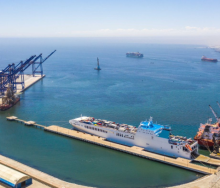The African Development Bank Group (AfDB) has granted financial support of 73.44 million euros to Cameroon for the construction of a bridge over the River Ntem, linking it with Equatorial Guinea.
Construction of the bridge was part of the Regional Trade and Transport Facilitation Project for the economic corridor between Cameroon, Equatorial Guinea and Gabon, a statement from the bank said.
The financial support consists of two separate loans: the first for Euro 48.96m from the AfDB and the second, of Euro 24.48m, from the African Development Fund, the Bank group's concessional loans window.
The new bridge, which will link Campo in Cameroon to Rio Campo in Equatorial Guinea, will not only improve the service level for the transport logistics chain along the corridor between Yaoundé, Bata and Libreville, but will also contribute to the emergence of an industrial-port activities hub in the area between the deepwater port in Kribi (Cameroon) and its counterpart in Bata (Equatorial Guinea).
In practical terms, the project will contribute to increasing the volume of trade between the two countries and reducing travel time, shipping and transport costs along the Yaoundé-Bata-Libreville multinational corridor. This will create favourable conditions for promoting an industrial-port activities hub in the same area, and improving the living conditions of various populations in its area of influence.
Implementation of the project is due to start in December 2023, with completion scheduled for November 2028.
"The African Development Bank is the leading partner for transport infrastructure development in Central Africa, in general, and Cameroon in particular. The support provided by our institution aims, among other things, to expand and maintain existing road networks in countries in the subregion and to accelerate regional integration," said Serge N'Guessan, the Bank's director-general for Central Africa and head of its country office in Cameroon.
The corridor forms part of the Transport Master Plan for Central Africa, adopted under the aegis of the Economic Community of Central African States (Eccas). Among other things, the master plan aims to link the economic and/or political capitals of the community's member states via tarmacked roads, including economic transport corridors, and to implement the road projects developed by the African Union Development Agency.
The project is also one of the priority operations of the third five-year stage (2021-25) of the "Economic Infrastructure and Territorial Development" component of the Regional Economic Programme being implemented by the Economic and Monetary Community of Central Africa (Cemac).
The Bank's interventions have enabled central African countries to implement several projects that are promoting a significant increase in intra-community trade, as well as strengthening regional integration within Cemac and Eccas.













